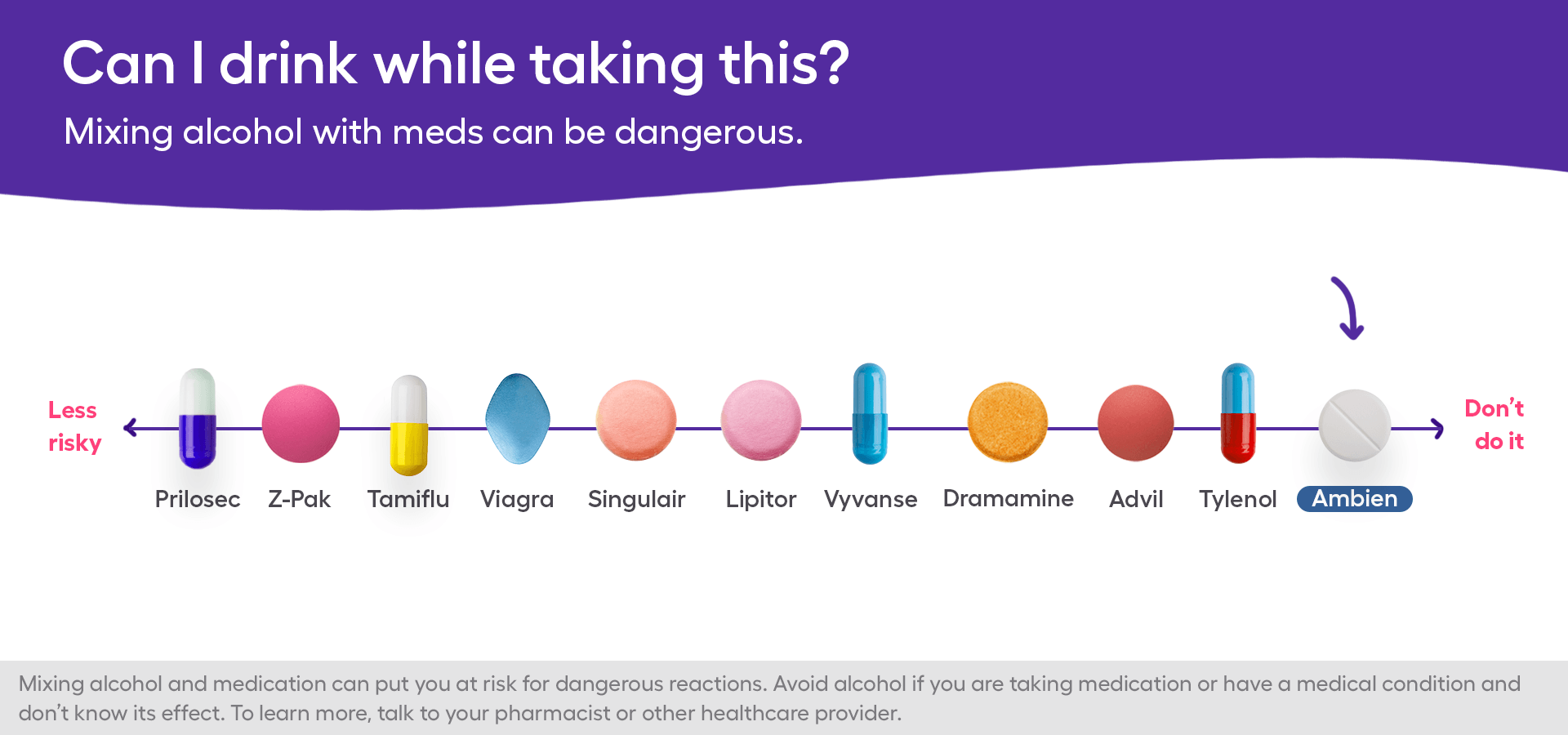After a long day at the office (or working from home), running some errands, cooking dinner, doing dishes and laundry, helping kids with homework, and finally enjoying a glass of wine and Netflix, you fall into bed, exhausted. Despite feeling tired, you just can’t fall asleep, so after a while, you reach for your prescription medication, Ambien.
But wait! Is it safe to mix Ambien and alcohol?
What is Ambien?
Ambien (zolpidem) is a prescription drug approved by the FDA, which is indicated for short-term use to treat insomnia. Ambien tablets contain the active ingredient zolpidem tartrate, a sedative-hypnotic drug. The brand-name and generic are available in immediate or extended-release form—called Ambien CR or zolpidem tartrate extended release.
Ambien is a Schedule IV controlled substance because of the possibility for abuse or dependence. As such, it is indicated only for short-term use, and should not be taken long-term. When prescribed by a healthcare provider, you should take the pill immediately before bedtime, when you can get at least seven to eight hours of restful sleep. Common side effects include drowsiness, dizziness, altered vision, decreased alertness, and impaired driving.
Ambien also has a black box warning that states the drug may cause individuals to experience something called complex sleep behaviors, such as sleepwalking, sleep-driving, or any other activities you do while not fully awake. These behaviors may lead to serious injury or even death.
When you take Ambien, it is important to follow the dosage prescribed by your medical professional.
What effects does mixing Ambien and alcohol have?
Ambien and alcohol are a dangerous combination. In fact, a report from the Drug Abuse Warning Network (DAWN) found that the combination of Ambien and alcohol was responsible for 14% of Ambien-related emergency room visits, with 13% requiring admission to the intensive care unit (ICU).
Central nervous system (CNS) depressant medications increase the activity of a substance called GABA, which produces a sedating and calming effect—but also slows brain activity. According to the prescribing information, Ambien has CNS depressant effects, which can lead to dangerous side effects such as slowed or difficulty breathing, slowed heart rate, and even loss of consciousness.
When patients mix Ambien with other CNS depressants, such as drugs or alcohol, the CNS effects are increased. This can cause profound sedation, slowed breathing—which could even lead to a loss of consciousness—coma, or even death in some cases. The DAWN study reported that 57% of emergency room visits for Ambien overdose also involved another drug or alcohol use.
Mixing Ambien and alcohol can also increase the risk of next-day impairment (also called psychomotor performance impairment), including driving impairment. Ambien also puts older individuals at a greater risk of falls, so combined with alcohol, there is additional impairment, leading to a higher risk of falls and fractures.
Can I take other sleeping pills with alcohol?
Like Ambien, other popular prescription sleep aids for insomnia such as Lunesta (eszopiclone) and Sonata (zaleplon), are CNS depressants. They’re known as “z-drugs” and should not be combined with alcohol, for the same reasons as Ambien.
Over-the-counter (OTC) sleep aids that contain doxylamine or diphenhydramine are popular treatment options for insomnia, but they cannot be mixed with alcohol either. Even though these medications (available under popular brand names like Unisom, Benadryl, and Tylenol-PM) are OTC, combining them with alcohol can cause the same reactions as Ambien.
Dietary supplements like melatonin or Valerian root are popular remedies used for insomnia. However, these supplements can also interact with alcohol. In short, most sleep aids—prescription or OTC—are not safe to mix with adult beverages.
Withdrawal symptoms of Ambien-alcohol
If you combine alcohol and Ambien or other z-drugs on a regular basis, and then you stop, you will likely have withdrawal symptoms, which could be severe or even deadly.
Within just eight hours of your last drink, you may start having a headache, anxiety, or palpitations. Symptoms can progress to fever, sweating, high blood pressure, and confusion. Some patients experience delirium tremens (DTs), which can occur several days later and cause disorientation, hallucinations, and seizures.
When you stop taking Ambien, withdrawal symptoms can occur within two days. These symptoms may include anxiety, tremors, mood swings, delirium, panic attacks, and seizures. Because of this, it’s important to seek help from a medical professional when attempting to stop.
Treatment for Ambien and alcohol addiction
If you have an Ambien and alcohol addiction, you will need a medically supervised detox program. After detox, you may need rehab, with individual, group, and family counseling support groups, and medication. You can work with doctors, nurses, and other healthcare professionals who are addiction specialists and will help return you to your best overall health.
Getting help is the first step to addiction treatment. If you need help for your alcohol abuse and Ambien addiction, you can ask your medical professional or request information about treatment and/or rehab centers for substance use disorders by calling the SAMHSA (Substance Abuse and Mental Health Services Administration) national helpline at 1-800-662-HELP or searching on the SAMHSA website. Psychology Today is another helpful resource.
6 safer ways to manage sleep disorders
If you don’t want to give up your nightly glass of wine, you can try some non-medicinal methods to improve your sleep instead of Ambien. Sleep hygiene is a term that refers to developing better sleep habits. Here are some tips you can try:
- Make your bedroom conducive to sleep. Keep out noise and light, and sleep at a comfortable temperature that’s not too hot or too cold. Use your bed for sleep and sex only.
- Try to develop a consistent sleep schedule by going to sleep and waking up around the same time each day, even on weekends. Keep naps short and not too late in the day, or avoid them if you can.
- Create a sleep routine. Take some time to wind down before bed without devices—read a book, try some relaxation, and lower the lights.
- Exercise daily. Physical activity can make it easier to fall asleep faster.
- Watch what you eat and drink. Reduce caffeine (especially later in the day). Avoid fatty, greasy, or spicy foods close to bedtime. If alcohol keeps you up, try not to drink it too late in the evening.
- Stop smoking. Nicotine is associated with difficulty initiating sleep.
If you have any questions about Ambien (and sleep issues), its adverse reactions, and combining Ambien and alcohol, ask your healthcare provider for professional medical advice.












